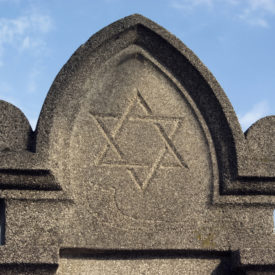What to expect at a Jewish funeral.
The Jewish faith embraces a formal mourning period and encourages open grieving and publicly expressing one’s emotions to help the mourner process their grief.
What to wear.
Dress conservatively in black or dark colors and suits, dresses or business attire. Jewish men usually wear a skullcap and women wear a head covering.
Appropriate gifts.
Don’t send flowers as they are usually not allowed during the service. Flowers are not placed on the plots either. Instead, stones, which unlike flowers don’t die, are placed at the headstones, symbolizing that the person’s memory will remain alive.
It’s acceptable to send cards and/or bring kosher food to a grieving Jewish family. Traditional offerings include round foods that symbolize life and renewal, like bagels, hard-boiled eggs, or a kosher fruit basket or baked goods. (Shiva baskets can be ordered online.)
Family support.
Shiva translates as “seven” and traditionally, mourners spend the week following a funeral in intense mourning. During this time, they stay home, receive visitors and condolences, and share stories about their deceased loved one. All other responsibilities are suspended.
- Call the family before visiting to offer condolences and support.
- If you visit a home during shiva, enter quietly. Don’t ring the bell or knock. The mourner’s home is open to the community and all are welcome.
- Plan to remove your shoes.
- Try not to stay more than an hour to avoid overwhelming the family.
Employer note:
- It’s not customary for a Jewish employee to work during shiva, which can last one to seven days, depending on the person.
- Shloshim is the traditional 30-day period of mourning that also includes Shiva. The mourner will transition back to routines but won’t attend any celebrations. During this time, haircuts and shaving are also avoided.

